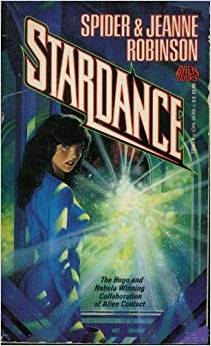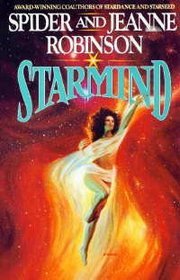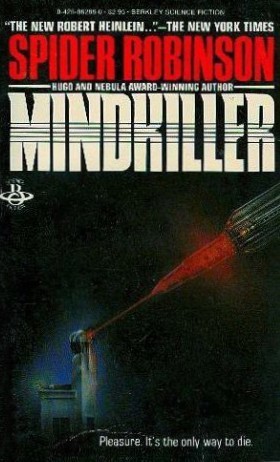 Stardance by Spider Robinson, Jeanne Robinson
Stardance by Spider Robinson, Jeanne Robinson Format: paperback
Source: purchased from bookstore
Formats available: hardcover, paperback, ebook, audiobook
Genres: science fiction, space opera
Series: Stardance #1
Pages: 288
Published by Baen Books on February 1st 1977
Purchasing Info: Author's Website, Publisher's Website, Amazon, Barnes & Noble, Kobo, Bookshop.org
Goodreads
A woman of perfect beauty is too big for perfect grace as a ballerina; she will never be more than an understudy. Stardance is the story of one such, one with the body of Venus di Milo and a talent greater than Pavlova's. But if there is an answer, genius will find it; Shara Drummond goes to Space, where her life is devoted to creating a weightless art form that is to Dance as three dimensions are to two.
Then the aliens arrive, beings of pure light who dance forever between the stars. And so it falls to Shara Drummond to prove that the human race is ... human. By her Stardance.
Guest Review by Amy:
Our story is told in the voice of Charlie Armstead, a cynical former dancer and videographer. He’s the best at what he does, (probably because he’s a former dancer), and when he gets the opportunity to shoot video of the finest dancer he’s ever known in zero gravity, he jumps at the chance. But when aliens show up, Shara Drummond must dance for them, and Charlie gets the tape of a lifetime. But, you see, that’s just the beginning of the story.
Escape Rating: A+. If you read the cover synopsis from the publisher, you might be misled into thinking that this book is about Shara Drummond, and her Stardance. I was, and when the dance with aliens came to a climactic conclusion a third of the way through the book, I was left wondering, “now what?” Frankly, I was a little bit mad that we’d hit the “end” so soon!
But, stubborn woman that I am, I kept reading, and when I finished the book, I had to spend rather a long time sussing out how I was going to describe this book. Because the end of Shara’s Stardance isn’t the end of the story; there’s a lot more to it, and Charlie must find his own way through to the end. It’s…complicated.
Spider and Jeanne Robinson have written a sonata, if you will. In the first movement, allegro, Shara does her dance for the aliens, Charlie taping every moment of it. This tape transforms the lives of a number of people in the second movement, a rondo, wherein Charlie and Shara’s sister Norrey marry and start a zero-gee dance school. In the third movement, the scherzo, the aliens return! An almost-pastoral coda ties up a few loose ends to the story’s structure, and we’re left with a tale to make you spend the night thinking about the real question that the Robinsons pose in this work: “What does it mean to be human?” Each part of the Stardance “sonata” is a story of its own, with its own tale to tell, and it isn’t until you get near the end that you figure out that all of these stories are actually a necessary part of a larger whole.
The first “movement” of this story doesn’t move terribly fast. Charlie is a depressive alcoholic, and it shows. That sort of life isn’t all that appealing to me, and so it made him a bit hard to like. After Shara’s dance, though, the transformative power of the Stardance wakes something up in him – he even later comments that it cured him of his alcoholism – and the vast profits from the tape let him move his life onto a more positive trajectory. Norrey is, as she has always been for him, a good influence, and when other members of their dance-school team join on, they forge an extended family of six: Three couples, one of them a gay couple, who love and trust each other completely. When the challenge arises, as the aliens return and park near Saturn, all six jump at the chance to go try to communicate with them, through their own Stardance.
There were some ironic moments for me in this book; one of the diplomats who accompanies the Stardancers out to Saturn is an American, Sheldon Silverman. He is nationalistic, vain, greedy, and always seeking a strategic advantage over the other five diplomats and the dancers. When he started causing problems, I had a thought: “well, of course. Stereotypical American politician.” Indeed, all of the diplomats in the group were somewhat trope-ish to me, from the cagey Chinese man to the Russian woman who tried (briefly) to bully the dancers, to the affable and brilliant Spaniard. This was a minor distraction, and it served the point that the us-vs-them that we embrace so much of here on Earth is part of the problem–but there is a solution, and in the end, when we find out that the aliens have the solution, two of the diplomats find that it just can’t work in their worldview.
 If this was the only work in this universe that Spider and Jeanne Robinson created, it would be enough; it tells us an epic story, with adventure, romance, thrills, and a bit of mystery. Even more, it challenges the reader to think about the nature of family and humanity. It’s definitely worth a look. Originally published in 1977, it has startling insight into the “progress” we’ve made in the years since its publication. But there are two other works in this trilogy (Starseed and Starmind), which I hope to track down soon. If they’re as wonderful as Stardance, I’ll be in for a couple of thoughtful, thoroughly wonderful reads.
If this was the only work in this universe that Spider and Jeanne Robinson created, it would be enough; it tells us an epic story, with adventure, romance, thrills, and a bit of mystery. Even more, it challenges the reader to think about the nature of family and humanity. It’s definitely worth a look. Originally published in 1977, it has startling insight into the “progress” we’ve made in the years since its publication. But there are two other works in this trilogy (Starseed and Starmind), which I hope to track down soon. If they’re as wonderful as Stardance, I’ll be in for a couple of thoughtful, thoroughly wonderful reads.

 Mindkiller by
Mindkiller by